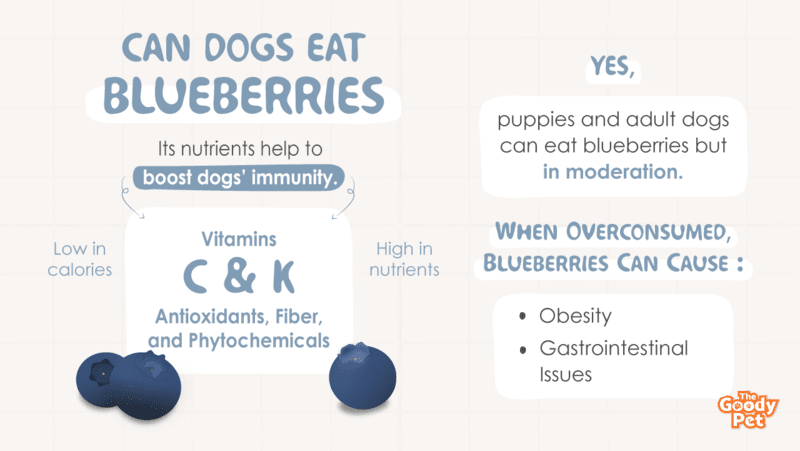When summer rolls around, blueberries become a favorite fruit for many. In fact, you’ll agree with me that no summer fruit salad is complete without blueberries. These fruits are tasty and have so much to offer to our bodies. But can dogs eat blueberries?
Yes, dogs can eat blueberries but in moderation. Blueberries are rich in antioxidants, essential compounds that help neutralize harmful free radicals in canines, keeping the dogs healthy and less susceptible to cancers.
Dogs benefit in many ways from eating blueberries. So yes, the next time you are tempted to share these tasty fruits with your fur baby, go ahead and do it. Only keep the amount of intake within “safe” levels. And yes, in this article, you will find information on how many blueberries a dog should eat, whether you can offer blueberries as a frozen treat to dogs when these sweet fruits can turn “sour” to canines, and much more! So yes, you couldn’t be luckier if you have any lingering questions related to dogs eating blueberries!
Can I Give My Puppy Blueberries?

Yes, you can give puppies blueberries. Puppies should eat blueberries for the same reason adult dogs should eat blueberries. However, before you can offer this delicious fruit to your little furry friend, there are a few things you need to know.
You see, not every food for adult dogs is good for the little lads. Puppies have more delicate and underdeveloped digestive systems. As such, there are some types of adult dog foods they shouldn’t eat. However, that doesn’t include blueberries. Puppies will handle blueberries just as well as their senior counterparts.
But again, the fact that blueberries are generally safe for puppies doesn’t give you the go-ahead to feed your small furry friend these fruits. Chat with an accredited vet before introducing blueberries to your puppy’s diet.
The vet has vast professional knowledge of your fur baby, so they will advise on whether or not your puppy’s health status allows them to eat blueberries safely.
The vet may also suggest the amount to give your pup and how to introduce blueberries to them. Consulting the vet may seem to be unnecessary, but it’s one thing you can’t afford to dodge when dealing with canines. So yes, be sure to work closely with the dog doctor.
Why Are Blueberries Good For Dogs?
Blueberries are good for dogs since they are low in calories but high in nutrients. These delicious summer fruits are a rich source of vitamin C, fiber, antioxidants, and phytochemicals. All these nutrients are beneficial to dogs, qualifying blueberries as a good snack for canines.
Now, before you give dogs any food, there are a host of factors to consider. For instance, there’s the need to take into account the number of calories the food contains. You don’t want your furry friend to become obese simply because you were careless with their eating.
Obesity increases a dog’s vulnerability to life-threatening chronic conditions. As such, every dog parent has to keep controlling the number of calories their fur babies eat. Fortunately, blueberries aren’t calorie-dense. With an ounce of blueberries offering just 16 calories, blueberries won’t make your dog gain weight.
Vitamin C, vitamin K, antioxidants, and phytochemicals in blueberries boost dogs’ immunity. These compounds will also fight brain aging, cancer, arthritis, and other joint-related issues. So yes, though blueberries don’t offer many calories, they still pack lots of healthy nutrients.
Are Blueberries Good For Dogs’ Eyes?
Yes, blueberries are good for dogs’ eyes. The carotenoids, flavonoids, zinc, and selenium compounds in blueberries play an essential part in boosting dogs’ general eye health, supporting night vision, and reducing eye fatigue.
Eye diseases are becoming prevalent in dogs. As such, the need for dogs to eat foods with eye-healthy nutrients is imperative. The good news? Nature has provided most of these foods, and blueberries are among the top foods on that list.
Do Blueberries Help Dogs Live Longer?
Yes, blueberries will help dogs live longer. A dog with an improved immune system, better eye health, a slow rate of aging, and better resistance to cancers is definitely at a lower risk of dying than one with compromised immunity.
Sure, it’s not possible to tell how long your dog will live. You also may not predict the cause of the death. But again, we know that dogs are likely to die from diseases. Hence, by improving dogs’ ability to resist illnesses, blueberries will reduce the risk of death from illnesses.
So yes, if you want more of those afternoon walks, or more summer memories with your adorable Fido, making blueberries part of your dog’s diet will somewhat prolong your pup’s lifespan.
How Many Blueberries Can I Give My Dog?

Only give your dog a moderate amount of blueberries. Like with any other treat, blueberries need to take at most 10% of what your dog should eat. So yes, as much as blueberries are healthy, keep this rule in mind to keep everything running smoothly in your dog’s tummy.
As a dog parent, you probably know that too much of a good thing is bad for dogs. That applies when it comes to blueberries. These tasty fruits benefit dogs a lot healthwise, but they can also cause trouble when taken in large amounts.
As such, always keep the portion size under control when giving dogs blueberries. For small dogs, ten blueberries is a healthy amount. In fact, anything more than that will likely attract issues. Bigger dogs can tolerate more. But again, that’s where you have to keep the 10% rule for treats in mind.
But can you give your dog blueberries every day? When is the best time to offer blueberries to pups? Is there a formula for doing things? Well, that’s just a bit of what awaits. So yes, keep reading!
How Often Can You Give Your Dog Blueberries?
You can give dogs blueberries as often as you please if they like them. Since these delicious fruits are safe and healthy for pups, there isn’t any harm in giving them to dogs more often. Blueberries can even come daily if that’s fine with your dog.
The low-calorie nature means that dogs can eat blueberries frequently. After all, these delicious fruits aren’t going to make your dog gain weight. But one thing you want to avoid is your fur baby becoming bored of eating the same treat every day.
Yes, you read that right – much like humans, dogs can get bored of eating the same food over and over again. Boredom could even come from tasty snacks like blueberries. As such, we recommend that you alternate between blueberries and other treats. For blueberries, once or twice a week is just fine.
A wide variety of treats won’t just help the dog beat boredom – they also ensure that pups get all the essential nutrients they need. No food contains all the nutrients your dog needs for healthy growth, so again, think about substituting blueberries with other treats.
How Do I Give My Dog Blueberries?
How you give your dog blueberries is as essential as the amount you give. Dogs can eat blueberries alone as a snack, and you can also mash them and mix them in the dog’s food. How you offer blueberries to dogs will depend on what seems to work best with your canine.
But even before you offer blueberries to dogs, we have two things to ensure. First, the blueberries have to be organic. In fact, that applies to any other fruit or food you buy for your furry friend.
You don’t want to expose your dog to pesticides and other chemicals sprayed on the non-organic variety. So yes, the next time you walk into that grocery store, ask for the organic type. That’s the first step to avoiding trouble.
Second, ensure that the blueberries are clean. Being organic alone doesn’t make blueberries safe to eat. No, not at all! Toxins can still attach themselves to the surface. So, using clean and fresh water, give the berries a thorough rinse.
Now, once the berries are clean and ready for eating, go ahead and offer them to your dog. Here, you have to stick to the rule of the thumb. And this is the rule – begin with a small amount and then increase it bit by bit as your pup gets used to them.
One thing you have to be careful to avoid is surpassing the recommended amount. Yes, with the gradual increase in the quantity you offer, exceeding the correct amount of blueberries to give is likely.
Sure, excess amounts won’t cause obesity, but there are still other consequences. For instance, it can stir up digestive issues. And as we all know, pups will develop something serious even from conditions that don’t look too serious.
In addition, when blueberries come in excess, they can substitute the regular food. The high amount of fiber keeps the dog feeling full for longer, meaning they will only eat less usual food than they should.
When Should Dogs Eat Blueberries?
Dogs should eat blueberries between meals if you don’t want to serve the treat in the food. Ideally, adult dogs need to eat twice per day – early in the morning (around 7 am) and early in the evening (around 6 pm). Blueberries work best between these feeding times (around noon).
Dogs take about 6 hours to digest anything they eat. It’s only after 8 to 10 hours when the hunger receptors in the stomach begin to send signals to the brain. That’s why vets recommend that adult dogs feed in the sunrise and sunset.
So yes, when offering blueberries, ensure that they come some hours after the meal. Avoid offering dogs blueberries immediately after or before a meal. There’s a wide gap between the two feeding times, so make use of the time when your dog needs blueberries the most.
When using blueberries for training, be strategic when scheduling the training sessions. Have them come at a time that works best for the treat. You don’t want to give your dog blueberries when they are full. Pups don’t so much need treats at that time, so they may lack the motivation for the reward.
Are Frozen Blueberries OK For Dogs?
Yes, frozen blueberries are okay for dogs. If you are looking for a creative way of keeping your dog cool during the hot summer afternoons, then frozen blueberries make for a refreshing snack for pups.
Freezing blueberries won’t rob them of nutrients. As such, think of feeding dogs with frozen blueberries much like killing two birds with one stone. Dogs get to enjoy a cold and refreshing snack when also benefiting healthwise from it.
A frozen yogurt-blueberry snack is another creative way of offering blueberries to dogs in summer. Only ensure that you use plain yogurt or even a non-fat plain. Again, yogurt is rich in calories, so keep the intake levels low!
Why Does My Dog Love Blueberries?
Dogs love blueberries because they are pleasantly sweet. To pups, blueberries are just as super tasty as to you. But beware, since these fruits are sweet, your dog will likely demand more blueberries than you should offer.
You see, we all love tasty stuff. That’s also the case for dogs. Your dog will like anything that tastes good, and that includes blueberries. That’s why you should keep these treats in a secure place inaccessible to dogs.

When Are Blueberries Bad For Dogs?
Blueberries are bad for dogs when overconsumed. Sure, they won’t kill your dog or even cause conditions such as obesity. However, with large intakes, blueberries will trigger gastrointestinal issues in pups.
There usually isn’t anything wrong with dogs eating blueberries. In fact, these treats are healthy and offer a big nutritional bonus to Fidos. However, in large amounts, even the best food for dogs can turn harmful.
In addition, blueberries are small. The tiny size places them in the category of foods that pose a choking hazard to canines. To keep everything running smoothly and safe, only feed dogs smaller portions of blueberries at a time.
Can Blueberries Upset A Dog’s Stomach?
Yes, blueberries can upset a dog’s stomach, but that’s not likely to happen. In fact, if you follow the vet’s guidelines when serving your dog this treat, blueberries won’t cause any stomach issues to canines.
Gastrointestinal issues such as stomach upset can come from excess eating, but they can also emanate from bacteria or other toxins you are likely to find on these berries. You don’t want to take any chances, so feed dogs clean blueberries and in moderation.
Do Blueberries Give Dogs Gas?
Yes, blueberries do give dogs gas. However, much like an upset stomach and other gastrointestinal issues, gas, technically called flatulence, will only happen when dogs don’t digest blueberries properly.
Flatulence can also come to dogs when they eat blueberries for the first time. You have to train your dog’s digestive system to a new food slowly by slowly before it can eventually adapt to it fully.
Can My Dog Be Allergic To Blueberries?
Yes, your dog can be allergic to blueberries. In fact, food allergies account for about 10% of all reported dog allergies. As such, always watch your dog closely after you give them blueberries for the first time.
While dogs don’t all show the same symptoms of food allergies, knowing the most common ones may help you know when your dog has a blueberry allergy. Dogs allergic to blueberries usually have digestive disturbances like vomiting, diarrhea, and gas. You may also notice itchy skin.






